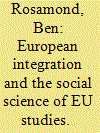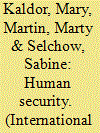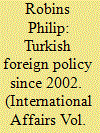|
|
|
Sort Order |
|
|
|
Items / Page
|
|
|
|
|
|
|
| Srl | Item |
| 1 |
ID:
076530


|
|
|
|
|
| Publication |
2007.
|
| Summary/Abstract |
Early indications suggest that the appointment of General Yaþar Büyükanýt as chief of the Turkish general staff (TGS) at the end of August 2006 marked a new era in civil-military relations in the country. Yet it would be a mistake to see the military's more forthright attitude under Büyükanýt simply as a return to the past. Civil-military relations in Turkey have always been characterized by a combination of continuity and change. Both the legal basis for and the TGS's own perceptions of the role and responsibilities of the military have remained unchanged for over 70 years. However, the extent and the manner in which the military has influenced politics have always varied. In recent years the TGS's ability to ensure that government policy remains within acceptable parameters has been primarily based on its public prestige rather than the prospect of a full-blooded military coup. Although the TGS has always been the most respected institution in the country, the Turkish public's willingness to tolerate, or even to encourage, its assumption of a more active political role has traditionally varied according to changes in the prevailing domestic political circumstances: falling during times of stability and confidence and rising during times of uncertainty. In early 2007 both the country and the government of the moderately Islamist Justice and Development Party (JDP) appeared to have lost momentum and direction. In such an environment, and in the continued absence of an eff ective political opposition, many Turks will once again look to the country's military to prevent the JDP from increasing its control over the apparatus of state, starting with the appointment of a new president in April 2007. To date the JDP has always backed down in the face of pressure from the TGS. However, whether it will continue to do so, and what the TGS can or will do if the JDP defies its warnings, currently all remain unclear.
|
|
|
|
|
|
|
|
|
|
|
|
|
|
|
|
| 2 |
ID:
076523


|
|
|
|
|
| Publication |
2007.
|
| Summary/Abstract |
This article takes the 50th anniversary of the Treaty of Rome as an opportunity to reflect upon half a century of academic discourse about the EU and its antecedents. In particular, it illuminates the theoretical analysis of European integration that has developed within political science and international studies broadly defined. It asks whether it is appropriate to map, as might be tempting, the intellectual `progress' of the field of study against the empirical evolution of its object (European integration/the EU). The argument to be presented here is that while we can, to some extent, comprehend the evolution of academic thinking about the EU as a reflex to critical shifts in the `real world' of European integration (`externalist' drivers), it is also necessary to understand `internalist' drivers of theoretical discourse on European integration/the EU. The article contemplates two such `internalist' components that have shaped and continue to shape the course of EU studies: scholarly contingency (the fact that scholarship does not proceed with free agency, but is bound by various conditions) and disciplinary politics (the idea that the course of academic work is governed by power games and that there are likely significant disagreements about best practice and progress in a field). In terms of EU studies, the thrust of disciplinary politics tends towards an opposition between `mainstreaming' and `pluralist versions' of the political science of EU studies. The final section explores how, in the face of emerging monistic claims about propriety in the field, an effective pluralist political science of the EU might be enhanced.
|
|
|
|
|
|
|
|
|
|
|
|
|
|
|
|
| 3 |
ID:
076524


|
|
|
|
|
| Publication |
2007.
|
| Summary/Abstract |
Tony Blair's decision to provide an indication of his departure date from 10 Downing Street has generated interest in the policies and style of his most likely successor, the current UK Chancellor of the Exchequer, Gordon Brown. Brown's ambitions for European policy are considered by a number of commentators to be less clear. This is because so far he has not produced a comprehensive vision of how he sees the UK's future relationship with the EU. However, as this article demonstrates, close examination reveals that his position on many aspects of European policy is actually already well documented.
|
|
|
|
|
|
|
|
|
|
|
|
|
|
|
|
| 4 |
ID:
076526


|
|
|
|
|
| Publication |
2007.
|
| Summary/Abstract |
This article examines the potential of human security as a narrative and operational frame for the European Union's external relations. Human security is about the security of individuals and communities and it links physical and material security-`freedom from fear', and `freedom from want'. The article addresses both the lexis (language) and praxis (practice)of human security in relation to the EU. Much of the language currently used in EU external relations, particularly crisis management, civil-military cooperation and conflict management, already contains elements of a human security approach. At the same time, the concept of human security goes beyond these terms and if formally adopted and elaborated could greatly strengthen the EU's role as a global security actor. The article develops five principles of human security-human rights, legitimate political authority, multilateralism and regional focus-and makes the case that the application of these principles would increase the coherence, effectiveness and visibility of EU missions. The article concludes that the adoption of a human security approach would build on the foundational ideas of Europe in overcominga history of war and imperialism and could help to rally public opinion behind the European idea. More importantly, it would contribute to closing the real security vacuum that exists in large parts of the world today.
|
|
|
|
|
|
|
|
|
|
|
|
|
|
|
|
| 5 |
ID:
076532


|
|
|
|
|
| Publication |
2007.
|
| Summary/Abstract |
The changing role of Islam in the public life of Turkey is about to come under renewed scrutiny, the key issue being the potential candidates for the May 2007 presidential election. Erdog?an, the Prime Minister and head of the first Islamist majority government in the republic's history, is likely to stand. Arguments already abound as to the legitimacy of such a move, with the opposition declaring that they will boycott the election if Erdog?an becomes a candidate. Equally, Erdog?an's own supporters are, in public, at least occasionally uncertain, conscious that when the late Özal moved to become president, his party suffered. Secularists grimly wonder whether they will be able to survive such an overt transfer to an Islamist figure, one whom they fear would be a great contrast to the pro-Republican present incumbent, President Sezer. Yet, how should we face such a transition? What implications does it have for Turkey's politics, both internally in terms of the social life of the country, and in external affairs?
|
|
|
|
|
|
|
|
|
|
|
|
|
|
|
|
| 6 |
ID:
076528


|
|
|
|
|
| Publication |
2007.
|
| Summary/Abstract |
This article examines EU-Turkey relations and considers the potential impact of the EU pronouncement at the December 2004 summit and the subsequent (reluctant)decision to begin negotiations in October 2005 on Turkey's efforts to become a member of the Union. It briefly summarizes the debate over Turkish accession and outlines the main arguments and positions of EU members and institutions. It then highlights the inadequacies of the alternatives to full membership that have been offered to Turkey in the past and expresses the concern that the EU's adoption of `flexible integration' may lead to Turkey being, at best, offered a `lower tier' form of EU membership in the future. It continues by arguing that concerns about Turkey's suitability for EU membership because it is Islamic and its lack of `Europeanness' are ill-founded and/or irrelevant and that the best way to facilitate Turkey's continued contribution to European (and world)security and its western orientation, is to allow it to join the EU as a full member. It concludes that the decision to admit a new member is primarily a political one and that Turkey should be allowed to join the EU in the immediate future.
|
|
|
|
|
|
|
|
|
|
|
|
|
|
|
|
| 7 |
ID:
076527


|
|
|
|
|
| Publication |
2007.
|
| Summary/Abstract |
This article discusses Turkish foreign policy over the past four years, since the election of a `post-Islamist' administration. It argues that although this period has been `Huntingtonian', in terms of the diff erent political values and origins of the government on the one hand and the largely Kemalist state on the other, in the realm of foreign policy at least the relationship has been more cooperative and complementary than confictual. By focusing on seven areas of Turkey's foreign relations, as diverse as the EU, Cyprus, Syria and the Israeli-Palestinian conflict, the article identifies four types of experience in the overall conduct of policy: convergence; contained disharmomy; managed ideological divergence; and neutrality. It concludes by arguing that, providing Turkey's political institutions remain robust, there is no reason why this surprisingly successful cohabitation should not continue into the next parliament after 2007.
|
|
|
|
|
|
|
|
|
|
|
|
|
|
|
|
| 8 |
ID:
076529


|
|
|
|
|
| Publication |
2007.
|
| Summary/Abstract |
The Justice and Development Party has been in power in Turkey since 2002 after a sweeping victory. The party has since implemented a successful economic stabilization programme and led the country into membership negotiations with the European Union. The educated modern-urban segments of the population, however, continue to harbour suspicion that the government party has a secret agenda of turning Turkey into an Islamic state. Although the evidence for such a fear is not fully convincing, it can be understood within the broader framework of Turkish modernization which was carried out by a highly centralized state in the cultural-educational domain in an uncompromising fashion, generating a social bifurcation between the moderns and the traditionalists. After the transition to competitive politics, elected politicians worked to curb the power of the state elites that have been the exponents of modernization policies. Supported also by economic development that has expanded society's power against the state, the political elites have worked to expand their scope for decision-making. Such redistribution of power in society has been problematical and has twice resulted in military interventions. The shift in the balance of power in favour of the political (elected) elite is nearing completion. The struggle is currently centered on the election of a new president by the parliament in May 2007 because historically the presidency has been seen as a position that counterbalances the preferences of the political elite by those of the state elite. Although likely to cause perturbations, the president will be elected by the Justice and Development Party. Consolidation of Turkey's democracy is continuing
|
|
|
|
|
|
|
|
|
|
|
|
|
|
|
|
|
|
|
|
|